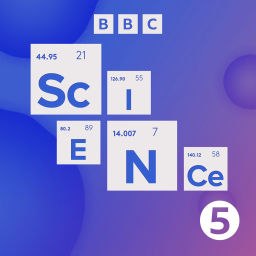
by BBC Radio 4
<p>Scientific principles, theory, and the role of key figures in the advancement of science.</p>
Language
🇺🇲
Publishing Since
10/29/1998
Email Addresses
1 available
Phone Numbers
0 available

April 3, 2025
<p>Since plants have to mate and produce offspring while rooted to the spot, they have to be pollinated – by wind, water, or animals – most commonly insects. They use a surprising array of tricks to attract pollinators: striking colours, iridescent light effects, and enticing scents, to name but a few. </p><p>Insects, on the other hand, do not seek to pollinate plants – they are looking for food; so plants make sure it’s worth their while. Insects are also remarkably sophisticated in their ability to find, recognise and find their way inside flowers. </p><p>So pollination has evolved as a complex dance between plants and pollinators that is essential for life on earth to continue. </p><p>With </p><p>Beverley Glover, Director of the Cambridge University Botanic Garden</p><p>Jane Memmott, Professor of Ecology at the University of Bristol</p><p>And</p><p>Lars Chittka, Professor of Sensory and Behavioural Ecology at Queen Mary, University of London.</p><p>Producer: Eliane Glaser</p><p>Reading list:</p><p>Stephen L Buchmann and Gary Paul Nabhan, The Forgotten Pollinators (Island Press, 1997)</p><p>Lars Chittka, The Mind of a Bee (Princeton University Press, 2023)</p><p>Steven Falk, Field Guide to the Bees of Britain and Ireland (British Wildlife Publishing, 2015)</p><p>Francis S. Gilbert (illustrated by Steven J. Falk), Hoverflies: Naturalists' Handbooks vol. 5 (Pelagic Publishing, 2015)</p><p>Dave Goulson, A Sting in the Tale: My Adventures with Bumblebees (Vintage, 2014)</p><p>Edwige Moyroud and Beverley J. Glover, ‘The evolution of diverse floral morphologies’ (Current Biology vol 11, 2017)</p><p>Jeff Ollerton, Birds and Flowers: An Intimate 50 Million Year Relationship (Pelagic Publishing, 2024) Alan E. Stubbs and Steven J. Falk, British Hoverflies (British Entomological & Natural History Society, 2002)</p><p>Timothy Walker, Pollination: The Enduring Relationship Between Plant and Pollinator (Princeton University Press, 2020)</p><p>In Our Time is a BBC Studios Audio Production</p>

January 30, 2025
<p>Melvyn Bragg and guests discuss slime mould, a basic organism that grows on logs, cowpats and compost heaps. Scientists have found difficult to categorise slime mould: in 1868, the biologist Thomas Huxley asked: ‘Is this a plant, or is it an animal? Is it both or is it neither?’ and there is a great deal scientists still don’t know about it. But despite not having a brain, slime mould can solve complex problems: it can find the most efficient way round a maze and has been used to map Tokyo’s rail network. Researchers are using it to help find treatments for cancer, Parkinson's and Alzheimer's disease, and computer scientists have designed an algorithm based on slime mould behaviour to learn about dark matter. It’s even been sent to the international space station to help study the effects of weightlessness. With</p><p>Jonathan Chubb Professor of Quantitative Cell Biology at University College, London</p><p>Elinor Thompson Reader in microbiology and plant science at the University of Greenwich</p><p>And</p><p>Merlin Sheldrake Biologist and writer</p><p>Producer: Eliane Glaser </p><p>In Our Time is a BBC Studios Audio production</p>

January 9, 2025
<p>Melvyn Bragg and guests discuss some of the great unanswered questions in science: how and where did life on Earth begin, what did it need to thrive and could it be found elsewhere? Charles Darwin speculated that we might look for the cradle of life here in 'some warm little pond'; more recently the focus moved to ocean depths, while new observations in outer space and in laboratories raise fresh questions about the potential for lifeforms to develop and thrive, or 'habitability' as it is termed. What was the chemistry needed for life to begin and is it different from the chemistry we have now? With that in mind, what signs of life should we be looking for in the universe to learn if we are alone?</p><p>With </p><p>Jayne Birkby Associate Professor of Exoplanetary Sciences at the University of Oxford and Tutorial Fellow in Physics at Brasenose College</p><p>Saidul Islam Assistant Professor of Chemistry at Kings College, London</p><p>And </p><p>Oliver Shorttle Professor of Natural Philosophy at the University of Cambridge and Fellow of Clare College</p><p>Producer: Simon Tillotson</p><p>Reading list: </p><p>David Grinspoon, Venus Revealed: A New Look Below the Clouds of Our Mysterious Twin Planet (Basic Books, 1998)</p><p>Lisa Kaltenegger, Alien Earths: Planet Hunting in the Cosmos (Allen Lane, 2024)</p><p>Andrew H. Knoll, Life on a Young Planet: The First Three Billion Years of Evolution on Earth (Princeton University Press, 2004)</p><p>Charles H. Langmuir and Wallace Broecker, How to Build a Habitable Planet: The Story of Earth from the Big Bang to Humankind (Princeton University Press, 2012)</p><p>Joshua Winn, The Little Book of Exoplanets (Princeton University Press, 2023)</p><p>In Our Time is a BBC Studios Audio Production</p>

BBC Radio 4

BBC Radio 4

BBC Radio 4

BBC Radio 4

BBC Radio 4

BBC Radio 4

BBC Radio 4

BBC World Service

BBC Radio 4

BBC World Service

BBC Radio 5 Live

BBC World Service

BBC World Service

Immediate Media

BBC Radio 4
Pod Engine is not affiliated with, endorsed by, or officially connected with any of the podcasts displayed on this platform. We operate independently as a podcast discovery and analytics service.
All podcast artwork, thumbnails, and content displayed on this page are the property of their respective owners and are protected by applicable copyright laws. This includes, but is not limited to, podcast cover art, episode artwork, show descriptions, episode titles, transcripts, audio snippets, and any other content originating from the podcast creators or their licensors.
We display this content under fair use principles and/or implied license for the purpose of podcast discovery, information, and commentary. We make no claim of ownership over any podcast content, artwork, or related materials shown on this platform. All trademarks, service marks, and trade names are the property of their respective owners.
While we strive to ensure all content usage is properly authorized, if you are a rights holder and believe your content is being used inappropriately or without proper authorization, please contact us immediately at [email protected] for prompt review and appropriate action, which may include content removal or proper attribution.
By accessing and using this platform, you acknowledge and agree to respect all applicable copyright laws and intellectual property rights of content owners. Any unauthorized reproduction, distribution, or commercial use of the content displayed on this platform is strictly prohibited.